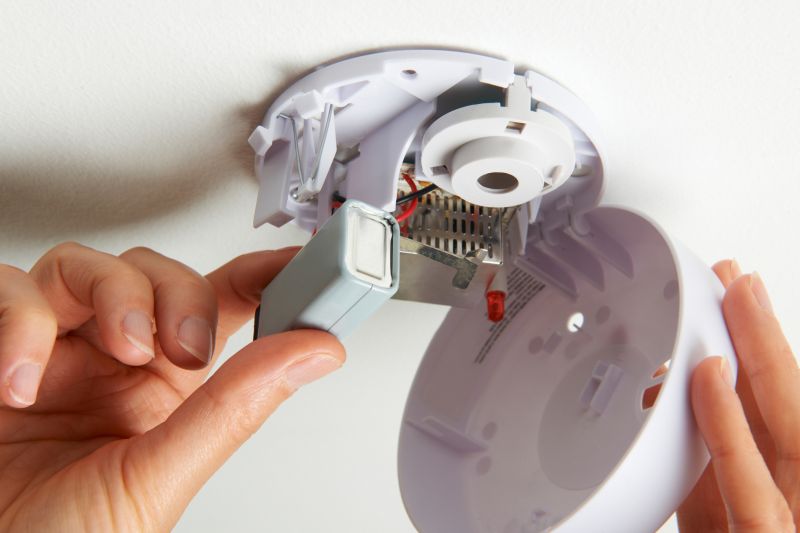Top Smoke Alarm Battery Replacement Solutions for Reliable Safety
Explore high-quality products designed to provide consistent power and peace of mind in your home security setup.
 Replacing batteries in smoke alarms is a routine maintenance task that can enhance safety and ensure continuous operation. Selecting the right type of battery depends on the specific model of the alarm, as well as personal preferences for longevity and ease of installation. Many modern smoke alarms utilize standard batteries, while others may require specialized or rechargeable options. It's important to regularly check the manufacturer's recommendations to maintain optimal performance.
Replacing batteries in smoke alarms is a routine maintenance task that can enhance safety and ensure continuous operation. Selecting the right type of battery depends on the specific model of the alarm, as well as personal preferences for longevity and ease of installation. Many modern smoke alarms utilize standard batteries, while others may require specialized or rechargeable options. It's important to regularly check the manufacturer's recommendations to maintain optimal performance.
Top Overall Option
High-Performance Alkaline Battery
A reliable choice for most smoke alarms, offering consistent power delivery and long shelf life. Designed for easy installation and dependable operation, it helps ensure your smoke detector remains functional when needed most.
Types of Products For Smoke Alarm Battery Replacements
Alkaline Batteries
Commonly used for their affordability and dependable performance across various smoke alarm models.
Lithium Batteries
Known for their long shelf life and stable power output, suitable for extended use in different environments.
Rechargeable Batteries
Reusable options that can be recharged multiple times, reducing waste and ongoing costs.
9-Volt Batteries
Often used in older or specialized smoke alarms, providing reliable power in a compact form.
Button Cell Batteries
Small-sized batteries for compact or specialized smoke alarm models requiring minimal power sources.
Rechargeable NiMH Batteries
A type of rechargeable battery offering good capacity and longevity for frequent replacements.
Silver Oxide Batteries
Low-drain batteries suitable for smoke alarms with minimal power consumption.
Carbon Zinc Batteries
An economical option for basic smoke alarms, providing adequate power for short-term use.
Rechargeable Lithium-ion Batteries
High-capacity rechargeable options that support long-term use in various alarm systems.
Specialty Batteries
Designed for specific alarm models or unique installation requirements, ensuring compatibility.
Popular Choices
Widely used for their affordability and reliable power in many smoke alarms.
Preferred for their extended shelf life and stable performance over time.
Growing in popularity for their reusability and consistent power output.
Chosen for their durability and long operational lifespan in various environments.
A common choice for everyday replacements, balancing cost and performance.
Ideal for small or specialized smoke alarms requiring minimal power sources.
Offering high energy density and long-term usability for frequent replacements.
Low-drain options suitable for alarms with minimal power requirements.
Economical choice for basic smoke alarm models and short-term use.
Designed to fit specific alarm systems or unique installation needs.
Battery technology has evolved to offer longer-lasting and more reliable power sources. Alkaline batteries are common due to their affordability and availability, providing dependable energy for most smoke alarms. Lithium batteries, on the other hand, tend to have a longer shelf life and can operate effectively in a wider range of temperatures, making them suitable for various environments. Rechargeable batteries are also gaining popularity among users interested in reducing waste and maintaining consistent power without frequent replacements.
When replacing smoke alarm batteries, consider the ease of installation. Some batteries feature user-friendly designs with quick-connect terminals or slide-in formats that simplify the process for homeowners. Additionally, safety features such as leak-proof construction or low self-discharge rates can enhance the reliability and lifespan of the power source. It is also advisable to keep spare batteries accessible in household emergency kits to facilitate timely replacements.
Regular maintenance, including timely battery replacements, plays a crucial role in ensuring that smoke alarms function correctly during emergencies. Many devices have low-battery alert signals, prompting users to replace batteries before they completely deplete. By choosing high-quality batteries suited to your specific alarms and maintenance habits, you can help maintain a safe living environment and reduce false alarms caused by weak power sources.
Key Buying Considerations
- Compatibility with your smoke alarm model to ensure proper fit and function.
- Battery lifespan and shelf life to minimize frequent replacements.
- Ease of installation, including user-friendly designs or quick-connect features.
- Performance in different temperature ranges and environmental conditions.
- Capacity and power output to match the alarm's energy requirements.
- Low self-discharge rates for batteries that retain charge over time.
- Cost-effectiveness considering both initial price and longevity.
- Availability in local stores or online for convenient replacement.
- Brand reliability and user reviews to gauge overall quality.
- Consideration of rechargeable options for reducing waste and ongoing costs.
- Leak-proof or sealed designs to prevent damage or corrosion.
- Size and shape compatibility with your specific smoke alarm model.
- Low self-discharge and long shelf life for emergency preparedness.
- Environmental conditions such as humidity or temperature extremes where the alarm is installed.
- Manufacturer recommendations to ensure optimal performance and safety.
This content contains affiliate links. We may earn a commission if you make a purchase through these links, at no additional cost to you.
